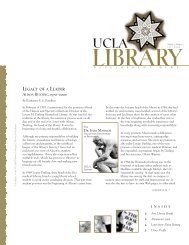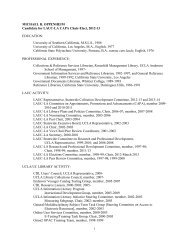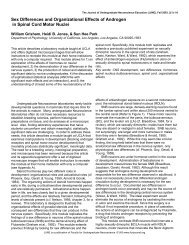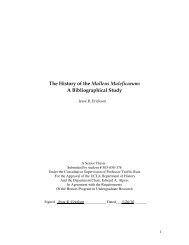Research Paper - UCLA Library
Research Paper - UCLA Library
Research Paper - UCLA Library
You also want an ePaper? Increase the reach of your titles
YUMPU automatically turns print PDFs into web optimized ePapers that Google loves.
Gu 17<br />
The very title of the work displays a certain kind of ambivalence towards the death of the virgin<br />
queen as sorrow is transformed into joy. Grammatically, the word “Sorrowes” modifies and<br />
possesses “Ioy,” suggesting that there is a sense of happiness hidden beneath the grief of the<br />
people over their lost queen. Although the term Gloriana is first associated with Elizabeth in the<br />
1580s, the association of the queen with Glory persists after her death. “Sorrowes Ioy” writes of<br />
Elizabeth’s death as “Glorie’s sunshine left the Royal Throne” (Nichols 2). The connection made<br />
between the deceased queen, glory, and the sun will be ironically inverted in The Revenger’s<br />
Tragedy as Gloriana’s ultimate triumph over her murderer will occur entirely in the dark (or at<br />
least an imagined dark as the play would have been performed during the day). Despite the<br />
fulfillment of Vindice’s revenge when the lecherous Duke dies, kissing the poisoned skull of the<br />
woman he had murdered, the figure of Gloriana in the play comes to be associated with death,<br />
decay, and darkness. There is no “glory” in The Revenger’s Tragedy’s Gloriana.<br />
The ambivalence presented in the title of “Sorrowes Ioy” may perhaps be explained by<br />
examining the succession fears of the 1590s when Elizabeth had become too old to marry or bear<br />
children. Indeed, one of the first historical accounts of the proclamation of James as the next king<br />
alludes to the succession issue. Stow’s Chronicle, written by an early modern historian, describes<br />
the events of March 24, 1603. According to Howes, the Lords “within six houres after her<br />
Highnesse death, made Proclamation at the Court Gates in the open assemblie, signifying and<br />
assuring the people her Majesty was dead, and that the right of succession was wholly in James<br />
the King of Scots” (Nichols 26). The usage of “assuring” in describing the proclamation of<br />
Elizabeth’s death is interesting as it suggests doubt and even anxiety. The following description<br />
of the people’s reaction by Howes is even more telling: “with one consent [they] cryed alowd,<br />
‘God save King James,’ being not a little glad to see their long feared danger so cleerely











